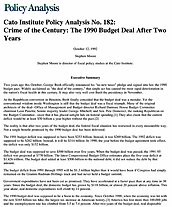Two years ago this October, George Bush officially renounced his “no new taxes” pledge and signed into law the 1990 budget pact. Widely acclaimed as “the deal of the century,” that single act has caused the most rapid deterioration in the nation’s fiscal health in this century. It may also very well cost Bush the presidency in November.
At the Republican convention in Houston, Bush finally conceded that the budget deal was a mistake. Yet the conventional wisdom inside Washington is still that the budget deal was a fiscal triumph. Many of the original architects of the deal–Office of Management and Budget director Richard Darman; House Budget Committee chairman Leon Panetta; Senate majority leader George Mitchell; and Sen. Pete Domenici, the ranking Republican on the Budget Committee–insist that it has placed airtight lids on federal spending.[1] They also claim that the current deficit would be at least $50 billion a year higher without the pact.[2]
The reality is that after two years of the budget deal, the federal fiscal situation has worsened in every measurable way. Not a single benefit promised by the 1990 budget deal has been delivered.
The 1991 budget deficit was supposed to have been $253 billion. Instead, it was $269 billion. The 1992 deficit was supposed to be $262 billion. Instead, it will be $314 billion. In 1990, the year before the budget agreement took effect, the deficit was only $152 billion.
The budget deal was supposed to save $500 billion over five years. When the budget deal was passed, the 1991–95 deficit was projected at $770 billion. The latest Congressional Budget Office estimates place the five-year deficit at $1.426 trillion. The budget deal added at least $500 billion to the national debt; it did not reduce the debt by that amount.
The budget deficit from 1991 through 1995 will be $1.3 trillion higher than it would have been if Congress had simply remained on the Gramm-Rudman-Hollings track and had never held a budget summit.
Government expenditures have not been cut as promised. They have accelerated at a faster pace than at any time in 30 years. Since the budget deal, the domestic budget has grown by $118 billion, or almost 20 percent above inflation. This year alone, real domestic expenditures will climb by 11 percent.
The 1990 budget deal was supposed to be a boon to the economy. Since October 1990, when the economy was hit with the new $165 billion tax hike, the largest tax increase in American history,[3] America has lost more than 100,000 jobs and the unemployment rate has climbed from 5.5 to 7.4 percent. After two years of the budget deal, real disposable personal income has actually fallen slightly.[4] Stagnation has been the market response to the 1990 Budget Act.
It is said that those who ignore the mistakes of history are doomed to repeat them. Budget summits are now known to be dangerous to America’s economic health. The 1990 budget deal is the third major bipartisan budget agreement since 1982 to end in higher taxes, higher spending, and deeper debt.[5]
Nevertheless, many prominent business leaders and politicians are urging yet another bipartisan budget agreement in 1993 or 1994. Clinton’s and Bush’s advisers have hinted that they would be eager to participate in negotiations to produce an even more grandiose package than the 1990 pact. That would, of course, mean even higher taxes. The unmistakable lesson of the 1990 budget agreement is that progress on the deficit can only be achieved through serious restraint of the growth rate of federal expenditures, not through another fraudulent budget summit.

This work is licensed under a Creative Commons Attribution-NonCommercial-ShareAlike 4.0 International License.
